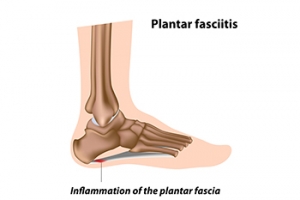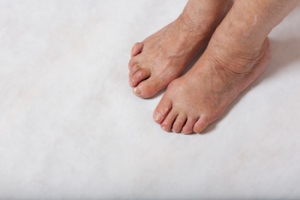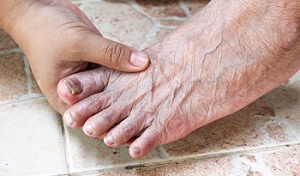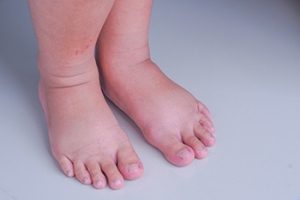Items filtered by date: August 2022
Treating Plantar Fasciitis With Surgery
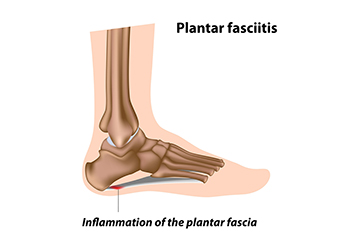
Plantar fasciitis is one of the most common foot conditions that causes heel pain. The plantar fascia is a long band composed of tissue, running from the heel to the toes. The plantar fascia also makes up the arch of the foot. When this band of tissue becomes irritated or inflamed, it is known as plantar fasciitis. This condition can be treated in several ways. If you do not respond to any of the less severe treatment options like orthotics or anti-inflammatory medications, you might be a candidate for a surgical procedure. The surgery, known as plantar fasciotomy, is a procedure that essentially moves the affected fascia away from the heel bone. This is done to ultimately reduce the tension that is causing the condition. There are two main kinds of surgery for plantar fasciitis. First, you may have an open surgery, which is performed in a hospital and includes making a 1-2 inch incision. Alternatively, you may have an endoscopic surgery, which involves making two small incisions that are less than half an inch deep. There are a variety of factors that can determine whether you are a candidate for this kind of surgery. If you are interested in this treatment and want to learn more, contact a podiatrist.
Plantar fasciitis can be very painful and inconvenient. If you are experiencing heel pain or symptoms of plantar fasciitis, contact Dr. Kenneth Donovan from Advanced Care Foot and Ankle. Our doctor can provide the care you need to keep you pain-free and on your feet.
What Is Plantar Fasciitis?
Plantar fasciitis is the inflammation of the thick band of tissue that runs along the bottom of your foot, known as the plantar fascia, and causes mild to severe heel pain.
What Causes Plantar Fasciitis?
- Excessive running
- Non-supportive shoes
- Overpronation
- Repeated stretching and tearing of the plantar fascia
How Can It Be Treated?
- Conservative measures – anti-inflammatories, ice packs, stretching exercises, physical therapy, orthotic devices
- Shockwave therapy – sound waves are sent to the affected area to facilitate healing and are usually used for chronic cases of plantar fasciitis
- Surgery – usually only used as a last resort when all else fails. The plantar fascia can be surgically detached from the heel
While very treatable, plantar fasciitis is definitely not something that should be ignored. Especially in severe cases, speaking to your doctor right away is highly recommended to avoid complications and severe heel pain. Your podiatrist can work with you to provide the appropriate treatment options tailored to your condition.
If you have any questions please feel free to contact one of our offices located in Warren, Livingston, and Toms River, NJ . We offer the newest diagnostic and treatment technologies for all your foot and ankle needs.
Different Types of Hammertoe
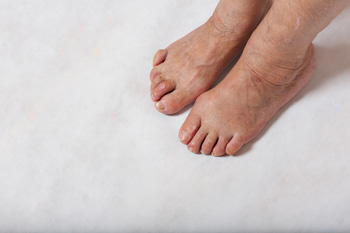
Of all the afflictions that can detrimentally affect the feet, some can manipulate the toes and the way that they function. Hammertoe is one such foot condition. An individual can develop hammertoe when the second, third, or fourth toe essentially points upward at the first toe joint. This condition is called hammertoe because the affected toe begins to resemble a hammer. There are two primary types of hammertoe. First, you may develop flexible hammertoe where the affected joint can still be moved. This is arguably the less severe case of hammertoe, because it can sometimes be treated by making simple adjustments, such as being more mindful of the footwear that one chooses. Second, you may develop rigid hammertoe, which restricts the individual from moving the affected toe joint. In some cases of rigid hammertoe, the condition can only be addressed through surgery. There are a variety of surgical procedures that might be used to address rigid hammertoe. For example, a medical professional might choose to perform a tendon transfer, joint resection, or fusion. If you suspect that you might have a hammertoe, reach out to a podiatrist who will be able to diagnose and treat the problem.
Hammertoe
Hammertoes can be a painful condition to live with. For more information, contact Dr. Kenneth Donovan from Advanced Care Foot and Ankle. Our doctor will answer any of your foot- and ankle-related questions.
Hammertoe is a foot deformity that affects the joints of the second, third, fourth, or fifth toes of your feet. It is a painful foot condition in which these toes curl and arch up, which can often lead to pain when wearing footwear.
Symptoms
- Pain in the affected toes
- Development of corns or calluses due to friction
- Inflammation
- Redness
- Contracture of the toes
Causes
Genetics – People who are genetically predisposed to hammertoe are often more susceptible
Arthritis – Because arthritis affects the joints in your toes, further deformities stemming from arthritis can occur
Trauma – Direct trauma to the toes could potentially lead to hammertoe
Ill-fitting shoes – Undue pressure on the front of the toes from ill-fitting shoes can potentially lead to the development of hammertoe
Treatment
Orthotics – Custom made inserts can be used to help relieve pressure placed on the toes and therefore relieve some of the pain associated with it
Medications – Oral medications such as anti-inflammatories or NSAIDs could be used to treat the pain and inflammation hammertoes causes. Injections of corticosteroids are also sometimes used
Surgery – In more severe cases where the hammertoes have become more rigid, foot surgery is a potential option
If you have any questions please contact one of our offices located in Warren, Livingston, and Toms River, NJ . We offer the newest diagnostic and treatment technologies for all your foot and ankle needs.
Food Servers and Foot Care

Many individuals earn their living by working as food servers, waiters, or waitresses. If you work as a food server, you are no doubt familiar with the fact that food servers spend the majority of the day working on their feet. Whether you are walking to and from the kitchen or carrying heavy dishes of food to tables, you spend a significant amount of the work day putting pressure on your feet. If you are not diligent about maintaining a foot care routine, you might be setting yourself up for a foot injury or condition. First, ensure that you are wearing the right kind of footwear on the job. Instead of wearing shoes with high heels that can increase your risk of falling during your shift, wear shoes with low, wide heels to provide stability. Second, since food servers spend such long amounts of time working on their feet, be sure to take the time you need to relax and pamper your feet. You may choose to give yourself a foot massage or to receive one professionally. These foot massages can relax muscles and ligaments in the feet, preventing tightening that could lead to injuries. Third, it is a good idea to be diligent about keeping your feet clean. For example, you might wash your feet to remove damaging bacteria, and pat them dry completely. Food servers ought to take the health of their feet seriously. If you work in the food service industry, contact a podiatrist to understand the best way to care for your feet.
While working on the feet, it is important to take the proper care of them. For more information about working on your feet, contact Dr. Kenneth Donovan from Advanced Care Foot and Ankle. Our doctor will treat your foot and ankle needs.
Working on Your Feet
Standing on your feet for long periods of time can cause stress and pain in your feet. Your whole body may experience change in terms of posture, back pain, bunions, callouses and or plantar warts. There are ways to avoid these conditions with proper foot care, smart choices and correct posture.
Positive Changes
Negative heeled shoe – Choosing this shoe type places the heel slightly lower than the ball of the foot. These are great for overall foot health. Find shoes that fit you correctly.
Go barefoot – Our feet were not designed to be enclosed for all hours of the day. Try to periodically expose your feet to air.
Eliminate Pain
Foot Exercises – Performing simple exercises, incorporating yoga and doing stretches are beneficial. This will allow increased blood flow to the area and muscles of the foot.
Achilles tendon – Stretching the foot out flat on the floor will relax the calf muscles and tendon. These exercises can be performed almost anywhere. Make sure you add these exercises to your daily regimen.
With a little bit of this information and knowing more about foot health, you will notice changes. Foot stretches and proper footwear will help with pain and prevent further issues.
If you have any questions please feel free to contact one of our offices located in Warren, Livingston, and Toms River, NJ . We offer the newest diagnostic and treatment technologies for all your foot and ankle needs.
Changes to Your Feet as You Age
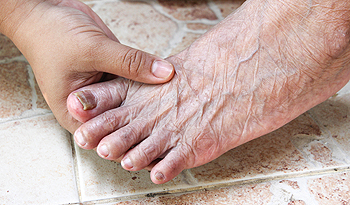
As people age, the body undergoes numerous changes, and changes to the feet are no exception. First, the skin becomes thinner, and you may notice joint pain you never had before from simple wear and tear. In addition, the muscles become weaker and less resilient. All this adds up to not being able to do many of the things that you used to do, or doing them more slowly and for shorter periods of time. Added to simply aging, certain conditions such as neuropathy, circulatory issues, and swelling of the feet (edema) may bring additional pain and increase the risk of injury or falling. The bones also begin to lose density, adding to the risk of fractures, especially in post-menopausal women. The fat pads in the heels and soles of the feet diminish, which may lead to such painful conditions as plantar fasciitis. Arthritis, an inflammation of the joints, may develop, causing more pain. Ways to stave off some of the effects of aging feet include finding footwear that fits properly and provides extra cushioning. Also, it is thought that foot and toe stretches help to keep the blood circulating and prevent swelling. Keeping your feet clean, dry, and moisturized can help you avoid infections. And watching your weight is important, as extra weight increases the load your feet have to support each time you take a step. For more information on taking care of your feet during your older years, please consult a podiatrist.
Proper foot care is something many older adults forget to consider. If you have any concerns about your feet and ankles, contact Dr. Kenneth Donovan from Advanced Care Foot and Ankle. Our doctor can provide the care you need to keep you pain-free and on your feet.
The Elderly and Their Feet
As we age we start to notice many changes in our body, but the elder population may not notice them right away. Medical conditions may prevent the elderly to take notice of their foot health right away. Poor vision is a lead contributor to not taking action for the elderly.
Common Conditions
- Neuropathy – can reduce feeling in the feet and can hide many life-threatening medical conditions.
- Reduced flexibility – prevents the ability of proper toenail trimming, and foot cleaning. If left untreated, it may lead to further medical issues.
- Foot sores – amongst the older population can be serious before they are discovered. Some of the problematic conditions they may face are:
- Gouging toenails affecting nearby toe
- Shoes that don’t fit properly
- Pressure sores
- Loss of circulation in legs & feet
- Edema & swelling of feet and ankles
Susceptible Infections
Diabetes and poor circulation can cause general loss of sensitivity over the years, turning a simple cut into a serious issue.
If you have any questions please feel free to contact one of our offices located in Warren, Livingston, and Toms River, NJ . We offer the newest diagnostic and treatment technologies for all your foot and ankle needs.
Various Reasons for Swollen Feet
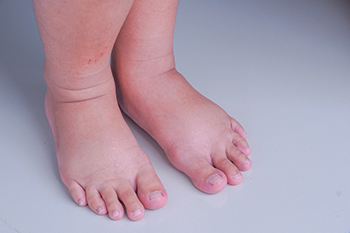
Many people have swollen feet and it is a rather common condition. It is easily noticed and can be uncomfortable. An injury is a common cause of this ailment which may disappear after the injury has healed. Additionally, there may be underlying health conditions that may cause the feet to swell and it can be a reason to seek prompt medical attention. Many pregnant women experience swollen feet, which is known as edema. Relief can come from frequently elevating the feet and from reducing salt intake. Various lifestyle factors may contribute to the development of swollen feet including sitting down for the majority of the day, wearing shoes that do not fit correctly, and being overweight. Edema may happen as a side effect of taking certain medications including antidepressants, hormones, or blood pressure medications. Many people have found effective methods that can help to control swollen feet. These can consist of drinking fresh water daily, staying active, losing an appropriate amount of weight, and consuming a healthy diet. If you suffer from swollen feet and would like to be properly diagnosed, please consult with a podiatrist who can guide you toward the correct treatment options.
Swollen feet can be a sign of an underlying condition. If you have any concerns, contact Dr. Kenneth Donovan of Advanced Care Foot and Ankle. Our doctor can provide the care you need to keep you pain-free and on your feet.
Swollen feet are a common ailment among pregnant women and people who stand or sit for extended periods. Aging may increase the possibility of swollen feet and patients who are obese often notice when their feet are swelling too. There may be medical reasons why swollen feet occur:
- Phlebitis - A condition that causes the veins to become inflamed and can also cause leg pain.
- Liver disease - This may lead to low blood levels of albumin which is a protein. This can cause fluid in the blood to pass into the tissues and several areas of the body can become swollen.
- Heart failure - When the heart doesn’t pump properly the blood that is normally pumped back to the heart can pool in the veins of the legs causing swollen feet.
- Kidney disease - One of the main functions of the kidneys is releasing excess fluid in the body. This type of condition can make it difficult for the kidneys to function properly, and as a result the feet may become swollen.
- Deep-vein thrombosis (DVT)- This is a serious condition where blood clots form in the veins of the legs. They can block the return of blood from the legs to the heart which may cause the feet to swell. It is important to be treated by a podiatrist if this condition is present.
Swollen feet can also be caused by bone and tendon conditions, including fractures, arthritis, and tendinitis. Additionally, there may be skin and toenail conditions and an infection may cause the feet to swell. Patients who take medicine to treat high blood pressure may be prone to getting swollen feet.
Many patients elevate their feet to help relieve the swelling and this is generally a temporary remedy. When a podiatrist is consulted the reason behind the swelling can be uncovered and subsequently treated.
If you have any questions please feel free to contact one of our offices located in Warren, Livingston, and Toms River, NJ . We offer the newest diagnostic tools and technology to treat your foot and ankle needs.
